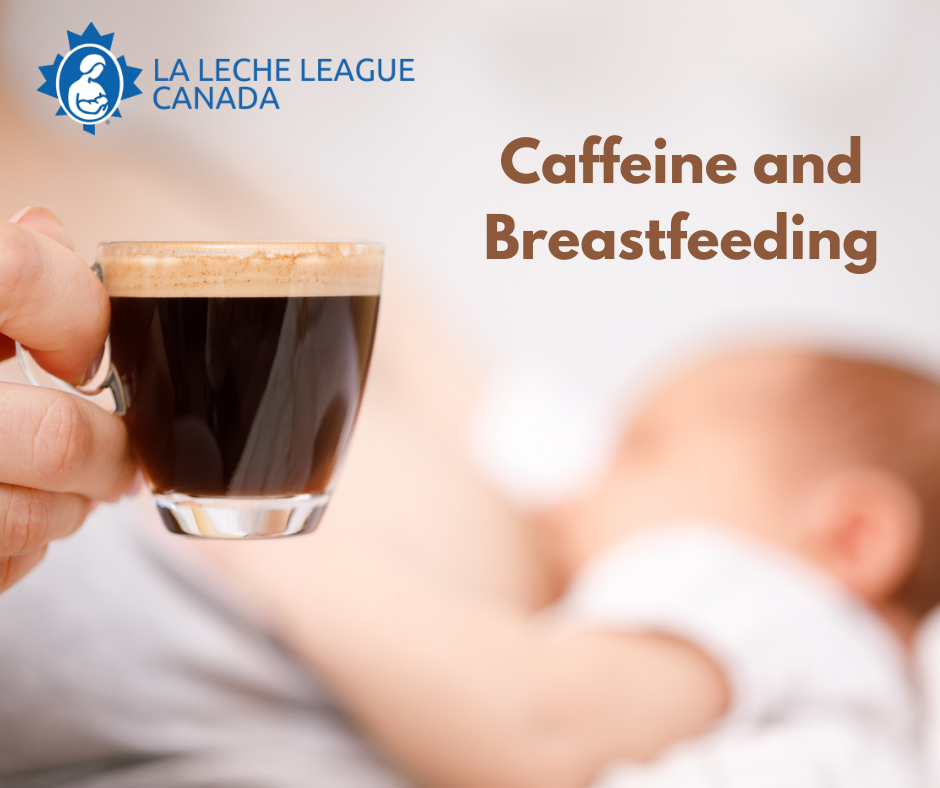
Many people enjoy their morning cup of coffee, including breastfeeding mothers. But you might wonder what kind of impact this could have on your baby.
Most nursing parents find that they are able to enjoy a moderate amount of caffeine without noticing any effects in their babies. It is important to take into account all of your potential sources of caffeine throughout the day. Sources of caffeine include:
- coffee
- black, white and green teas both hot and iced
- colas, and other caffeine containing soft drinks
- energy drinks
- yerba mate or guarana
- some over the counter medications including pain relievers, cold remedies and diuretics.
Caffeine does pass into breastmilk, however, your baby gets only about 1.5% of the amount of caffeine that you drank. It takes longer for caffeine to clear out of your baby’s body if your baby is premature, younger than six months or has other health issues. The peak level of caffeine in breastmilk occurs 60 to 120 minutes (1 to 2 hours) after consumption. If you have a high caffeine intake it could make your baby irritable, fussy or wakeful. This is because caffeine stimulates the central nervous system and helps us stay awake.
Examples of caffeine amounts in common beverages:
- Coffee: A 250 ml (8 oz) cup of coffee contains between 80 and 179 mg of caffeine.
- Decaffeinated coffee: A 250 ml (8 oz) cup contains between 3 and 15 mg of caffeine. Most colas: A 355 ml (12 oz) can contains between 37 to 50 mg of caffeine.
- Black tea: A 250 ml (8 oz) cup contains between 43 and 50 mg of caffeine.
Fussiness, jitteriness and sleeping problems have been found in babies whose mothers consumed high levels of caffeine, more than 5 cups of coffee each day. There is no agreed upon safe level of caffeine because every baby’s tolerance is different. However, Dieticians of Canada recommends a limit of 300 mg of caffeine (2 to 3 cups of coffee) daily for pregnant and breastfeeding mothers.
Another reason to limit your caffeine intake is its potential effect on iron levels. Consuming more than 450 mg of caffeine in one day (4 or 5 cups) has been linked to lower iron levels in human milk. Since breastfeeding babies get the iron they need from breastmilk during the first 6 months this could affect the amount of iron in the baby’s body.
Your caffeine intake is something to consider adjusting if your baby seems to be extremely fussy and has a hard time settling, even if you are drinking less than five cups of caffeinated beverages a day. You may want to consider having most of your caffeine early in the day. Or you could try substituting a decaffeinated or caffeine-free option for one, two or all caffeinated drinks for a week or two to see if it makes any difference. If caffeine is affecting your baby you should notice a difference within 3 to 7 days.
Please consider supporting LLLC.
References:
La Leche League International. (2021, June). Caffeine. https://www.llli.org/breastfeeding-info/caffeine/
Mohrbacher, Nancy. (2020). Breastfeeding Answers: A Guide for Helping Families, Second Edition. Nancy Mohrbacher Solutions, Inc.National Library of Medicine. (2022, June 20). Caffeine. Drugs and Lactation Database (Lactmed). https://www.ncbi.nlm.nih.gov/books/NBK501467/Dieticians of Canada. (2018, April 26). Facts on Caffeine. UnlockFood.ca. https://www.unlockfood.ca/en/articles/caffeine/facts-on-caffeine.aspx
Updated 2022
